Unit 2 How often do you exercise? Section A (1a-1c) 课件(共20张PPT,无音频) 人教版英语八年级上册
文档属性
| 名称 | Unit 2 How often do you exercise? Section A (1a-1c) 课件(共20张PPT,无音频) 人教版英语八年级上册 | 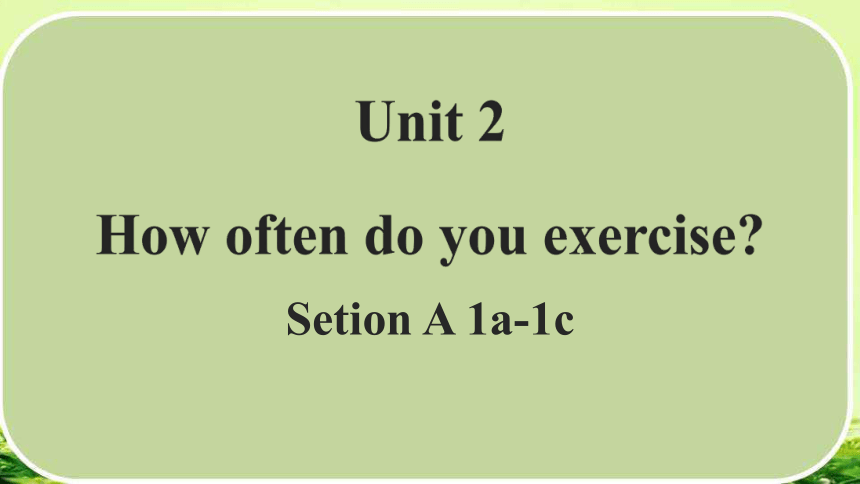 | |
| 格式 | pptx | ||
| 文件大小 | 5.0MB | ||
| 资源类型 | 教案 | ||
| 版本资源 | 人教新目标(Go for it)版 | ||
| 科目 | 英语 | ||
| 更新时间 | 2023-09-06 07:01:12 | ||
图片预览


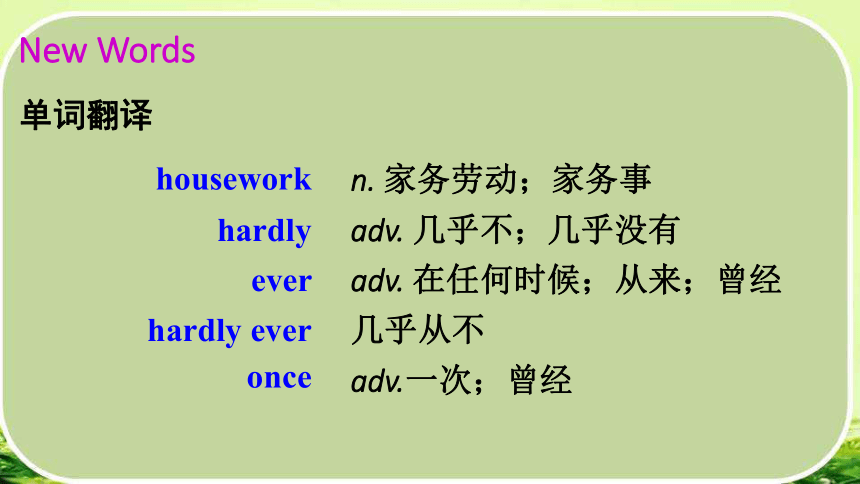
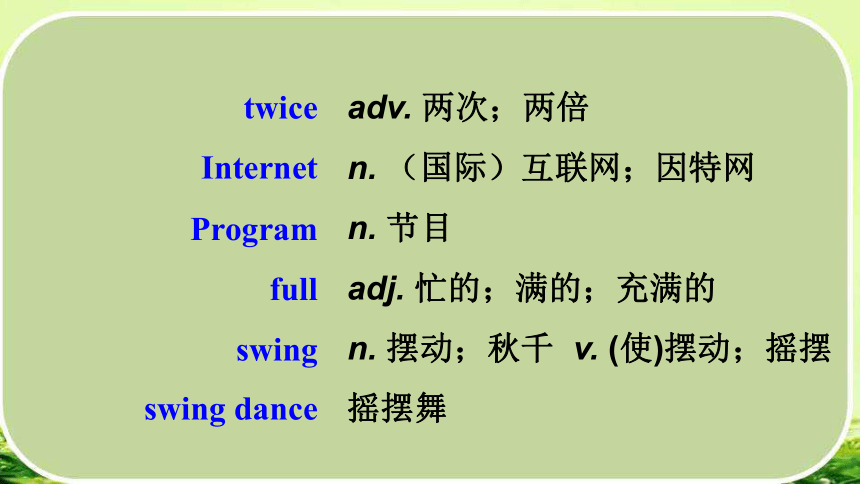
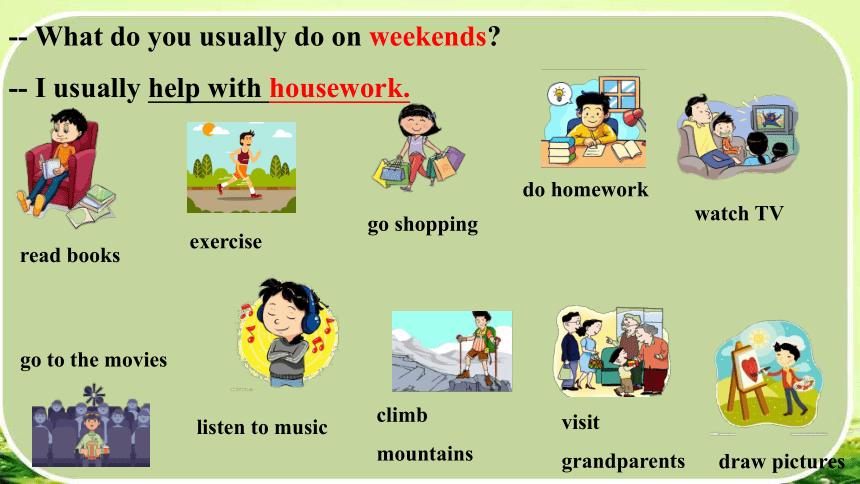

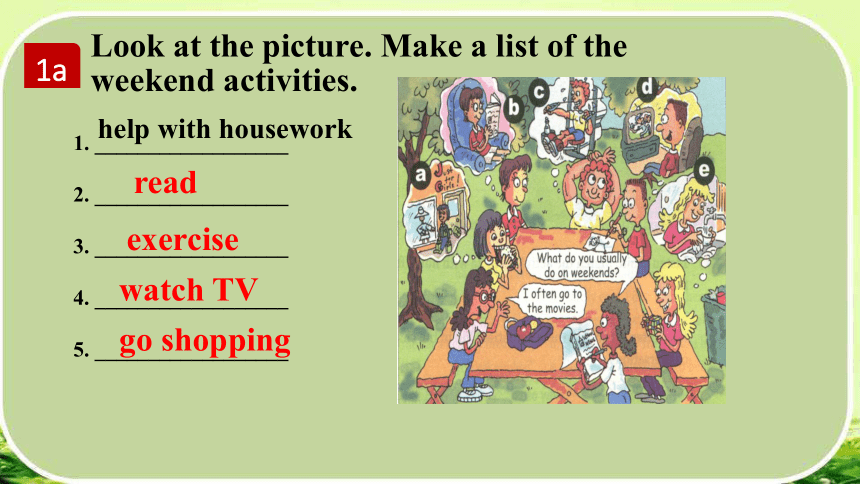
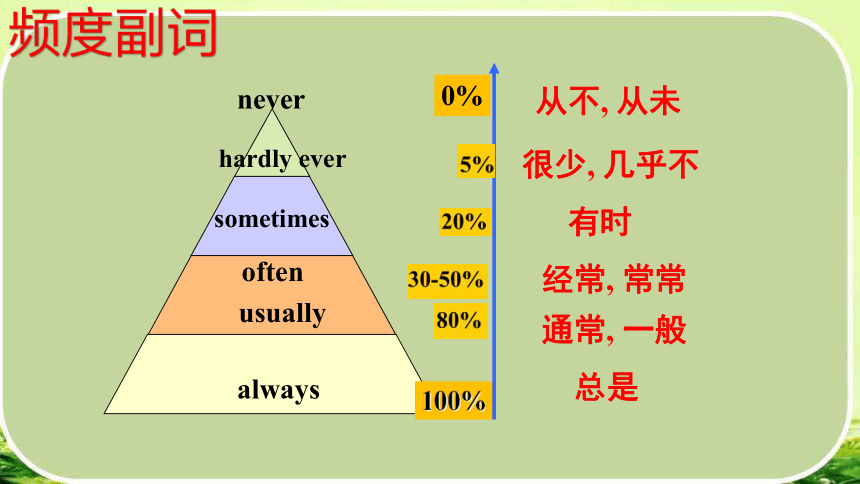
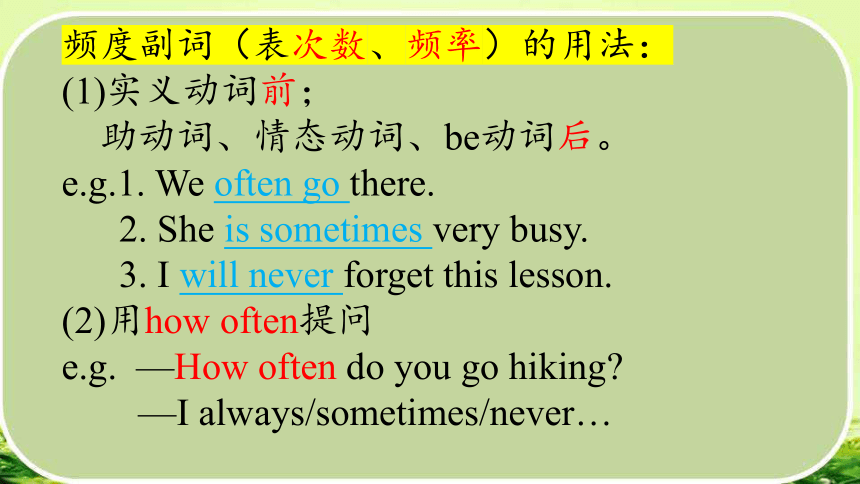
文档简介
(共20张PPT)
Unit 2
How often do you exercise
Setion A 1a-1c
objectives
To learn to talk about how often you do things with some adverbs of frequency: always/ usually/ often/ sometimes/ hardly ever /never
2. To listen for some specific information in conversations
3. To learn some new words and expressions
New Words
单词翻译
housework
hardly
ever
hardly ever
once
n. 家务劳动;家务事
adv. 几乎不;几乎没有
adv. 在任何时候;从来;曾经
几乎从不
adv.一次;曾经
twice
Internet
Program
full
swing
swing dance
adv. 两次;两倍
n. (国际)互联网;因特网
n. 节目
adj. 忙的;满的;充满的
n. 摆动;秋千 v. (使)摆动;摇摆
摇摆舞
-- What do you usually do on weekends
-- I usually help with housework.
read books
exercise
go shopping
go to the movies
listen to music
do homework
climb mountains
watch TV
visit grandparents
draw pictures
What does she/he usually do on weekends
She/ He usually ________on weekends.
read books
exercise
go shopping
go to the movies
listen to music
do homework
climb mountains
visit grandparents
Look at the picture. Make a list of the
weekend activities.
1. __________________
2. __________________
3. __________________
4. __________________
5. __________________
help with housework
read
exercise
watch TV
go shopping
1a
always
usually
often
sometimes
hardly ever
never
从不, 从未
很少, 几乎不
有时
经常, 常常
通常, 一般
总是
100%
0%
频度副词
频度副词(表次数、频率)的用法:
(1)实义动词前;
助动词、情态动词、be动词后。
e.g.1. We often go there.
2. She is sometimes very busy.
3. I will never forget this lesson.
(2)用how often提问
e.g. —How often do you go hiking
—I always/sometimes/never…
1b
Listen and write the activities next to the correct
frequency words.
always(100%) _________________
usually _________________
often __________________
sometimes __________________
hardly ever __________________
never(0%) ___________________
excrcise,
read
watch TV
help with housework
go shopping
watch TV
go shopping
Reporter: What do you usually do on weekends
Girl 1: I _________ go shopping.
Boy 1: I _________ go shopping. I usually watch TV.
Boy 2: I ______ exercise.
Girl 2 : I _______ help with housework.
Reporter: How about you
Girl 3: I ___________ watch TV. I _______ read.
Reporter: Oh, why is that
Girl 3: Oh, I don't know. I guess I just like books.
sometimes
never
always
often
Listen again and fill in the blanks with the words you hear.
hardly ever
always
Make conversations about the people in the picture.
always
always
usually/
hardly ever
often
sometimes/
never
A: What do you do on weekends?
B: I usually watch TV.
A: Do you go shopping
B: No, I never go shopping.
1c
What do you usually do on weekends
I often go to movies.
do homework
play football
watch TV
go shopping
do some reading
What does she/he usually do on weekends
He/Sheoften goes to movies.
do homework
play football
watch TV
go shopping
do some reading
Pairwork:
A:What does he/she do on weekends
B: He/She always/usually/often/sometims…
A: Does he/she...
B: Yes, he/she...
No, he/she hardly ever / never...
read( a book)
watch TV
go shopping
exercise=do sports
go to the movies
use the Internet
help with housework
1. Exercise
exercise v. 锻炼;
exercise n. [U]运动; [C]练习
如:
让我们做练习吧。
Let’s do our exercises.
散步是很好的运动。
Walking is a good exercise.
Language points
1. hardly 只用作副词,其意思是“几乎不”,表示否定概念。
e.g.他不太会说英语。
He can hardly speak English.
hardly ever 几乎从不
e.g. 彼得几乎从不迟到。
Peter is hardly ever late.
Explaination
hard 也用副词,意为“努力地、刻苦地”,“猛烈地” 。
e.g.他只在考试前努力学习。
He works hard only before exams.
辨析
1. I sleep 8 hours every night.(画线提问)
_____ _____ ______ do you sleep every night
2. He watches TV twice a week.(画线提问)
_____ _____ _____ he watch TV
3. Jack does his homework every day.
(改为否定句)
Jack _______ _____ his homework every day.
How many hours
How often does
doesn’t do
句型转换。
1. 你周末通常做什么?
What do you usually do on weekends
2. 我有时候购物。
I sometimes shop . / I sometimes go shopping.
3. 我从不购物, 我通常看电视。
I never go shopping. I usually watch TV.
4. 我经常帮忙做家务。
I often help with housework.
Unit 2
How often do you exercise
Setion A 1a-1c
objectives
To learn to talk about how often you do things with some adverbs of frequency: always/ usually/ often/ sometimes/ hardly ever /never
2. To listen for some specific information in conversations
3. To learn some new words and expressions
New Words
单词翻译
housework
hardly
ever
hardly ever
once
n. 家务劳动;家务事
adv. 几乎不;几乎没有
adv. 在任何时候;从来;曾经
几乎从不
adv.一次;曾经
twice
Internet
Program
full
swing
swing dance
adv. 两次;两倍
n. (国际)互联网;因特网
n. 节目
adj. 忙的;满的;充满的
n. 摆动;秋千 v. (使)摆动;摇摆
摇摆舞
-- What do you usually do on weekends
-- I usually help with housework.
read books
exercise
go shopping
go to the movies
listen to music
do homework
climb mountains
watch TV
visit grandparents
draw pictures
What does she/he usually do on weekends
She/ He usually ________on weekends.
read books
exercise
go shopping
go to the movies
listen to music
do homework
climb mountains
visit grandparents
Look at the picture. Make a list of the
weekend activities.
1. __________________
2. __________________
3. __________________
4. __________________
5. __________________
help with housework
read
exercise
watch TV
go shopping
1a
always
usually
often
sometimes
hardly ever
never
从不, 从未
很少, 几乎不
有时
经常, 常常
通常, 一般
总是
100%
0%
频度副词
频度副词(表次数、频率)的用法:
(1)实义动词前;
助动词、情态动词、be动词后。
e.g.1. We often go there.
2. She is sometimes very busy.
3. I will never forget this lesson.
(2)用how often提问
e.g. —How often do you go hiking
—I always/sometimes/never…
1b
Listen and write the activities next to the correct
frequency words.
always(100%) _________________
usually _________________
often __________________
sometimes __________________
hardly ever __________________
never(0%) ___________________
excrcise,
read
watch TV
help with housework
go shopping
watch TV
go shopping
Reporter: What do you usually do on weekends
Girl 1: I _________ go shopping.
Boy 1: I _________ go shopping. I usually watch TV.
Boy 2: I ______ exercise.
Girl 2 : I _______ help with housework.
Reporter: How about you
Girl 3: I ___________ watch TV. I _______ read.
Reporter: Oh, why is that
Girl 3: Oh, I don't know. I guess I just like books.
sometimes
never
always
often
Listen again and fill in the blanks with the words you hear.
hardly ever
always
Make conversations about the people in the picture.
always
always
usually/
hardly ever
often
sometimes/
never
A: What do you do on weekends?
B: I usually watch TV.
A: Do you go shopping
B: No, I never go shopping.
1c
What do you usually do on weekends
I often go to movies.
do homework
play football
watch TV
go shopping
do some reading
What does she/he usually do on weekends
He/Sheoften goes to movies.
do homework
play football
watch TV
go shopping
do some reading
Pairwork:
A:What does he/she do on weekends
B: He/She always/usually/often/sometims…
A: Does he/she...
B: Yes, he/she...
No, he/she hardly ever / never...
read( a book)
watch TV
go shopping
exercise=do sports
go to the movies
use the Internet
help with housework
1. Exercise
exercise v. 锻炼;
exercise n. [U]运动; [C]练习
如:
让我们做练习吧。
Let’s do our exercises.
散步是很好的运动。
Walking is a good exercise.
Language points
1. hardly 只用作副词,其意思是“几乎不”,表示否定概念。
e.g.他不太会说英语。
He can hardly speak English.
hardly ever 几乎从不
e.g. 彼得几乎从不迟到。
Peter is hardly ever late.
Explaination
hard 也用副词,意为“努力地、刻苦地”,“猛烈地” 。
e.g.他只在考试前努力学习。
He works hard only before exams.
辨析
1. I sleep 8 hours every night.(画线提问)
_____ _____ ______ do you sleep every night
2. He watches TV twice a week.(画线提问)
_____ _____ _____ he watch TV
3. Jack does his homework every day.
(改为否定句)
Jack _______ _____ his homework every day.
How many hours
How often does
doesn’t do
句型转换。
1. 你周末通常做什么?
What do you usually do on weekends
2. 我有时候购物。
I sometimes shop . / I sometimes go shopping.
3. 我从不购物, 我通常看电视。
I never go shopping. I usually watch TV.
4. 我经常帮忙做家务。
I often help with housework.
同课章节目录
- Unit 1 Where did you go on vacation?
- Section A
- Section B
- Unit 2 How often do you exercise?
- Section A
- Section B
- Unit 3 I'm more outgoing than my sister.
- Section A
- Section B
- Unit 4 What's the best movie theater?
- Section A
- Section B
- Unit 5 Do you want to watch a game show?
- Section A
- Section B
- Unit 6 I'm going to study computer science.
- Section A
- Section B
- Unit 7 Will people have robots?
- Section A
- Section B
- Unit 8 How do you make a banana milk shake?
- Section A
- Section B
- Unit 9 Can you come to my party?
- Section A
- Section B
- Unit 10 If you go to the party, you'll have a grea
- Section A
- Section B
